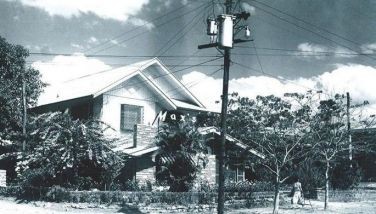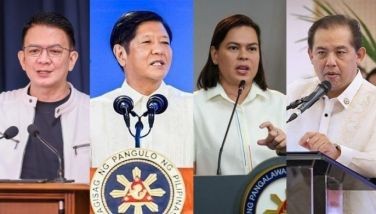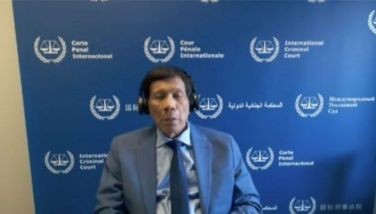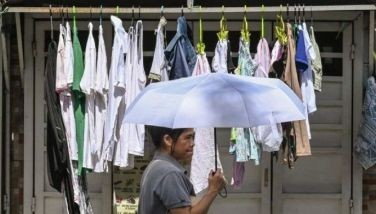‘PDAF unconstitutional’
MANILA, Philippines - The Priority Development Assistance Fund (PDAF), widely reviled as a source of corruption among politicians and officials, was declared unconstitutional yesterday by the Supreme Court (SC).
The ruling comes as Congress ponders tapping the unused PDAF for this year to boost funds for humanitarian and rehabilitation efforts in areas in the Visayas ravaged by Super Typhoon Yolanda and the 7.2 magnitude earthquake. PDAF is the official name of the congressional pork barrel.
The ruling also came amid public outrage over allegations that some politicians had embezzled the fund through dubious non-government organizations linked to businesswoman Janet Lim-Napoles.
After the controversy erupted, President Aquino ordered the abolition of PDAF in its present form.
In its ruling penned by Associate Justice Estela Perlas-Bernabe, the SC voided PDAF and all its previous forms, including the earlier countrywide development fund.
The high tribunal also ruled yesterday that the Malampaya Fund should be used exclusively for energy related projects and not “for such other purposes as may be hereafter directed by the President.â€
Voting unanimously, the magistrates decided to stop the government from disbursing or releasing what remains of the P24.79-billion PDAF for this year.
The SC also directed prosecutorial agencies like the Department of Justice and the Office of the Ombudsman to “investigate and prosecute all government officials and/or private individuals for possible criminal offenses related to the irregular, improper and/or unlawful disbursement of all funds under the pork barrel system.â€
The high tribunal held that PDAF and previous pork barrel funds violated the constitutional principle of separation of powers of the executive and legislative branches as it “allowed legislators to wield, in varying gradations, non-oversight, post-enactment authority in vital areas of budget executions.â€
The high court also ruled that the pork barrel system violated the constitutional principle of “non-delegability of legislative power†by allowing lawmakers to fund specific projects they themselves determine.
The pork barrel system as well as congressional insertions in the national budget also denied the President the power to veto items, the SC explained.
The high court also ruled that PDAF “impaired public accountability†and “subverted genuine local autonomy.â€
The SC specifically thumbed down the practice in the pork barrel system of allowing lawmakers “to intervene, assume or participate in any of the various post-enactment stages of the budget execution, such as but not limited to the areas of project identification, modification and revision of project identification, fund release and/or fund realignment unrelated to the power of congressional oversight.â€
The provisions allowing personal, lump sum allocations to legislators from which they draw funds for specific projects that they themselves have determined were also declared illegal by the high court.
The high tribunal rejected the argument presented by Solicitor General Francis Jardeleza last Oct. 8 and 10 that the SC had upheld the constitutionality of the pork barrel system in previous cases like LAMP vs. DBM.
It also rejected Jardeleza’s position that the issue on PDAF should be best settled through a “political solution.â€
The high tribunal also declared unconstitutional section 8 of Presidential Decree No. 910 allowing the President to use the Malampaya Fund in projects not related to energy.
Established in 1976, the Malampaya Fund is generated from royalties from oil and gas finds in the country.
The fund is supposedly for financing “energy resource development and exploitation programs and projects of the government.â€
But portions of the fund allegedly had been used for ghost projects.
The SC also voided section 12 of Presidential Decree No. 1869, as amended by Presidential Decree No. 1993, which allows the use of the Presidential Social Fund (PSF) “to finance the priority infrastructure development projects.â€
The SC ruled that the two provisions violated the principle of “non-delegability†of legislative power since they allowed the use of the Malampaya Fund and the PSF for other purposes.
In a press conference, SC spokesman Theodore Te clarified that only PDAF funds would be returned to the national coffers. He said the Malampaya Fund and the PSF “shall remain therein to be utilized for their respective special purposes.â€
This ruling was approved by 14 magistrates led by Chief Justice Ma. Lourdes Sereno, an appointee of President Aquino. Associate Justice Presbitero Velasco Jr. inhibited since his son Lord Allan is an elected representative of Marinduque.
In its decision, the SC was upholding the petitions filed by losing senatorial candidates Greco Belgica and Samson Alcantara and former Boac, Marinduque mayor Pedrito Nepomuceno.
DAP next
The Supreme Court (SC) also began scrutinizing the controversial Disbursement Acceleration Program (DAP) of President Aquino after striking down PDAF.
In oral arguments, the magistrates of the high court zeroed in on the nature of DAP – whether it’s savings or a fund.
Counsels for the nine petitioners against DAP argued that the funding scheme cannot be considered as “saving.â€
One of them, Bayan Muna Rep. Carlos Zarate stressed that the sources of DAP funds – including unused appropriations in the General Appropriations Act, abandoned projects and sale of government assets – were definitely not savings.
He told the high court that DAP is “presidential porkâ€and a form of “budgetary dictatorship.â€
“The only power of the President is to spend, not to allocate or transfer funds,†he pointed out.
During interpellation, Senior Associate Justice Antonio Carpio asked if DAP had the written approval of the President.
“In 2011, there was no written authorization for the DAP. But they said they realized savings. DBM (Department of Budget and Management) realigned, but we have not seen a prior approval of the President, correct?†he asked, to which Rep. Zarate agreed.
Carpio said Budget Secretary Florencio Abad, who was in the hearing as resource person, continued to realign funds this year even without written approval from the President.
“The General Appropriations Acts must be precise… DAP projects were not authorized by Congress… It [provides] flexibility to the President to indiscriminately transfer funds,†Zarate argued.
Another counsel for petitioners, Philippine Constitution Association chair Manuel Lazaro, agreed. He said “the power to appropriate lies (with) Congress, not (with) the DBM.â€
“The creation and implementation of the DAP… is not only unconstitutional and illegal but it is also vitiated with grave abuse of discretion,†he stressed.
DAP was presented as a discretionary lump sum under the executive department, said another counsel, Roger Rayel.
- Latest
- Trending




























